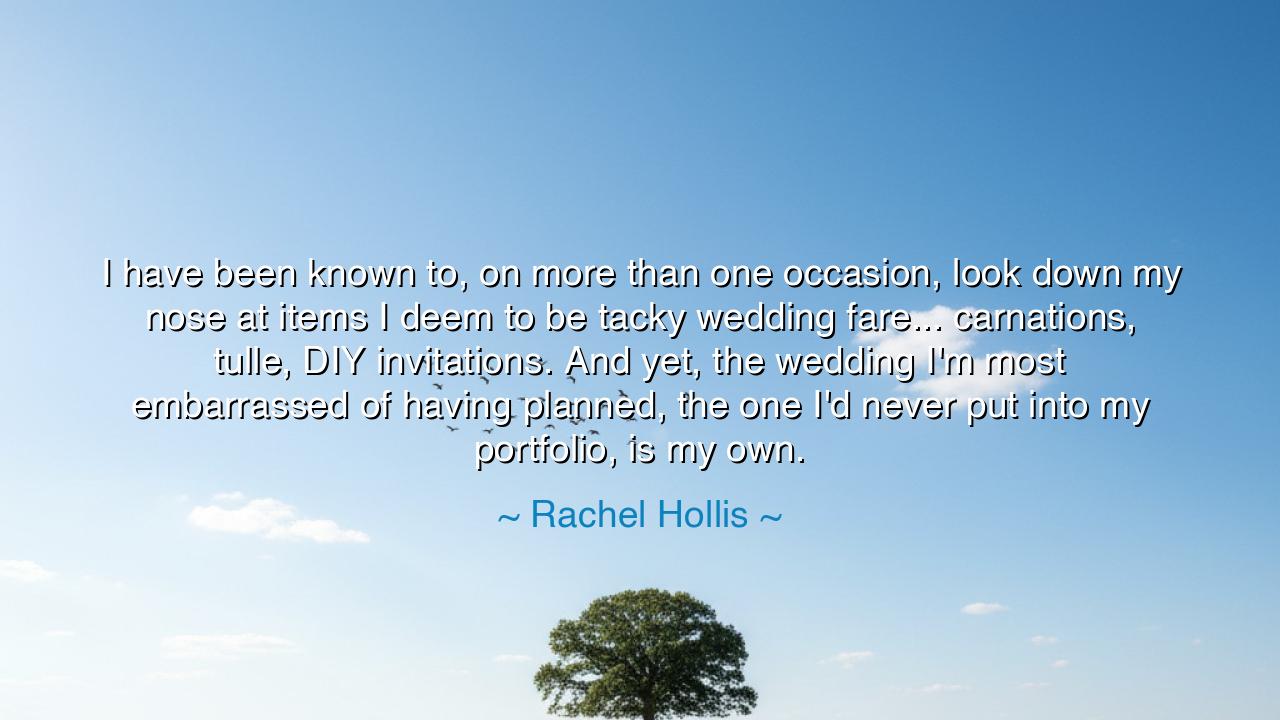
I have been known to, on more than one occasion, look down my
I have been known to, on more than one occasion, look down my nose at items I deem to be tacky wedding fare... carnations, tulle, DIY invitations. And yet, the wedding I'm most embarrassed of having planned, the one I'd never put into my portfolio, is my own.






Hearken, O children of humility and self-awareness, to the words of Rachel Hollis, who speaks with candor of her own imperfection. She admits that she has often looked down her nose at things she deemed tacky wedding fare—simple carnations, tulle, or DIY invitations—judging them as unworthy of elegance or taste. Yet, in a twist of irony, she confesses that the wedding she is most embarrassed by is none other than her own, a celebration she would not even display in her portfolio of work. In this truth lies a profound teaching: that judgment often blinds us to our own failings, and that wisdom is born from confronting this humbling reflection.
The wedding, a symbol of beauty and unity, is often clouded by societal expectations and aesthetic ideals. Hollis’s disdain for certain items reveals how easily the human heart can fall into the trap of pride, valuing appearances above meaning. But her confession exposes the deeper reality: the external trappings of a wedding—no matter how polished or refined—are secondary to the inner authenticity of the moment. Even the most "perfect" celebration can feel hollow if it does not reflect the truth of the couple’s hearts.
Consider the tale of Marcus Aurelius, the Roman emperor and stoic philosopher. Though he ruled with vast power, he warned against arrogance, reminding himself daily that others’ flaws mirror his own. Likewise, Hollis’s journey reflects the ancient wisdom that to judge others harshly is to ignore the imperfections within ourselves. By admitting her embarrassment over her own wedding, she demonstrates the courage to face her pride and emerge with greater empathy and humility.
Her words also speak to the illusion of control. Weddings are often planned with the desire to create an image of perfection, but life’s unpredictability disrupts even the most meticulous plans. Hollis’s experience shows that no amount of preparation can guarantee harmony, and that embracing imperfection is itself an act of grace. A humble wedding filled with carnations and handmade invitations may carry more joy than an elaborate one lacking love and authenticity.
O seekers of wisdom, understand this: comparison is the thief of joy. When we measure our celebrations against others, we lose sight of their true purpose. Hollis’s journey teaches that the value of a wedding lies not in the portfolio of a planner or the approval of guests, but in the sincerity of the vows and the shared memories created.
Thus, O children, carry this lesson in your hearts: let your celebrations, whether grand or simple, be guided by authenticity and love. Judge not the choices of others, for the flowers that seem plain to one may hold deep meaning for another. In embracing both your own imperfections and those of others, you will discover a beauty far greater than any outward display—a beauty born of humility, connection, and truth.






AAdministratorAdministrator
Welcome, honored guests. Please leave a comment, we will respond soon